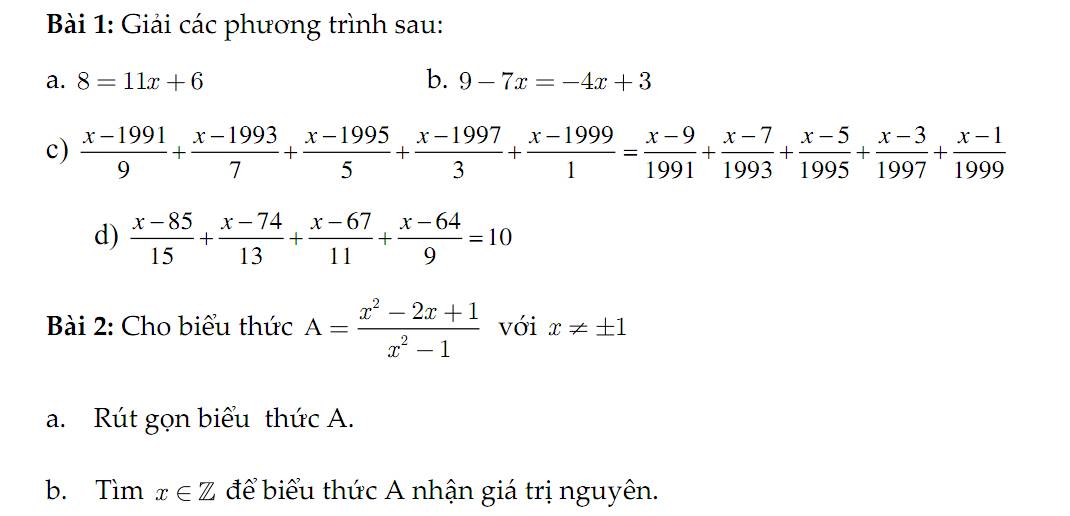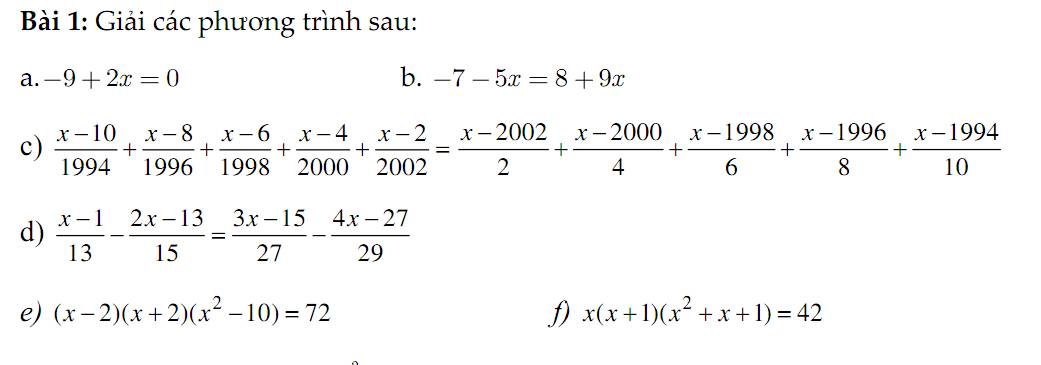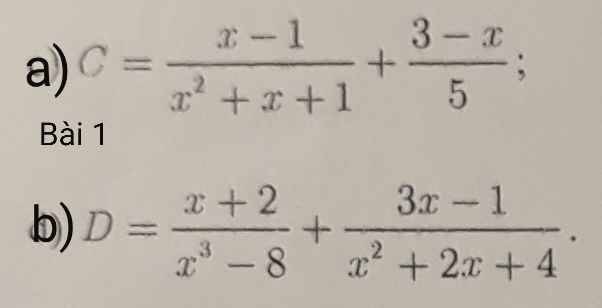a)(x^2 +2x+1)-x-1 trên 3=6(x+1)^2-5x-5 trên 6
b)(x-1)-2(x-1) trên 3-1 + (2x-2) trên 2
c)(x-2)^2=(2x-3)^2-(x+1)^2
d)(x-2)(x^2-3x+5)=x^2-2x^2
giúp mik nhanh vs đc mấy câu vs ak
a)(x^2 +2x+1)-x-1 trên 3=6(x+1)^2-5x-5 trên 6
b)(x-1)-2(x-1) trên 3-1 + (2x-2) trên 2
c)(x-2)^2=(2x-3)^2-(x+1)^2
d)(x-2)(x^2-3x+5)=x^2-2x^2
giúp mik nhanh vs đc mấy câu vs ak
a: \(\dfrac{\left(x^2+2x+1\right)-x-1}{3}=\dfrac{6\left(x+1\right)^2-5x-5}{6}\)
=>\(\dfrac{x^2+x}{3}=\dfrac{6\left(x^2+2x+1\right)-5x-5}{6}\)
=>\(\dfrac{2x^2+2x}{6}=\dfrac{6x^2+12x+6-5x-5}{6}\)
=>\(\dfrac{6x^2+7x+1}{6}=\dfrac{2x^2+2x}{6}\)
=>\(6x^2+7x+1=2x^2+2x\)
=>\(4x^2+5x+1=0\)
=>(x+1)(4x+1)=0
=>\(\left[{}\begin{matrix}x=-1\\x=-\dfrac{1}{4}\end{matrix}\right.\)
b: Đề thiếu vế phải rồi bạn
c: \(\left(x-2\right)^2=\left(2x-3\right)^2-\left(x+1\right)^2\)
=>\(\left(x-2\right)^2=\left(2x-3-x-1\right)\left(2x-3+x+1\right)\)
=>\(\left(x-2\right)^2=\left(x-4\right)\left(3x-2\right)\)
=>\(3x^2-2x-12x+8=x^2-4x+4\)
=>\(3x^2-14x+8-x^2+4x-4=0\)
=>\(2x^2-10x+4=0\)
=>\(x^2-5x+2=0\)
=>\(x=\dfrac{5\pm\sqrt{17}}{2}\)
d: Sửa đề: \(\left(x-2\right)\left(x^2-3x+5\right)=x^3-2x^2\)
=>\(\left(x-2\right)\left(x^2-3x+5\right)-x^2\left(x-2\right)=0\)
=>\(\left(x-2\right)\left(x^2-3x+5-x^2\right)=0\)
=>\(\left(x-2\right)\left(-3x+5\right)=0\)
=>(x-2)(3x-5)=0
=>\(\left[{}\begin{matrix}x=2\\x=\dfrac{5}{3}\end{matrix}\right.\)
 giup em bai 1 cau c,d vÀ bài 2 câu b ạh....Cảm ơn ạ
giup em bai 1 cau c,d vÀ bài 2 câu b ạh....Cảm ơn ạ
1c.
\(\Leftrightarrow\dfrac{x-1991}{9}-1+\dfrac{x-1993}{7}-1+...=\dfrac{x-9}{1991}-1+\dfrac{x-7}{1993}-1+...\) (dài quá làm biếng ghi hết, em cứ hiểu là trừ mỗi số hạng 2 vế cho 1)
\(\Leftrightarrow\dfrac{x-2000}{0}+\dfrac{x-2000}{7}+\dfrac{x-2000}{5}+\dfrac{x-2000}{3}+\dfrac{x-2000}{1}=\dfrac{x-2000}{1991}+\dfrac{x-2000}{1993}+\dfrac{x-2000}{1005}+\dfrac{x-2000}{1997}+\dfrac{x-2000}{1999}\)
\(\Leftrightarrow\left(x-2000\right)\left(\dfrac{1}{9}+\dfrac{1}{7}+\dfrac{1}{5}+\dfrac{1}{3}+1-\dfrac{1}{1991}-\dfrac{1}{1993}-\dfrac{1}{1995}-\dfrac{1}{1997}-\dfrac{1}{1999}\right)=0\)
\(\Leftrightarrow x=2000\)
(do \(\dfrac{1}{9}+\dfrac{1}{7}+\dfrac{1}{5}+\dfrac{1}{3}+1-\dfrac{1}{1991}-\dfrac{1}{1993}-\dfrac{1}{1995}-\dfrac{1}{1997}-\dfrac{1}{1999}\ne0\))
d.
\(\dfrac{x-85}{15}+\dfrac{x-74}{13}+\dfrac{x-67}{11}+\dfrac{x-64}{9}=10\)
\(\Leftrightarrow\dfrac{x-85}{15}-1+\dfrac{x-74}{13}-2+\dfrac{x-67}{11}-3+\dfrac{x-64}{9}-4=0\)
\(\Leftrightarrow\dfrac{x-100}{15}+\dfrac{x-100}{13}+\dfrac{x-100}{11}+\dfrac{x-100}{9}=0\)
\(\Leftrightarrow\left(x-100\right)\left(\dfrac{1}{15}+\dfrac{1}{13}+\dfrac{1}{11}+\dfrac{1}{9}\right)=0\)
\(\Leftrightarrow x=100\)
(do \(\dfrac{1}{15}+\dfrac{1}{13}+\dfrac{1}{11}+\dfrac{1}{9}\ne0\))
2.
\(A=\dfrac{x-1}{x+1}=\dfrac{x+1-2}{x+1}=1-\dfrac{2}{x+1}\)
Do 1 nguyên nên A nguyên khi \(\dfrac{2}{x+1}\) nguyên
\(\Rightarrow x+1=Ư\left(2\right)=\left\{-2;-1;1;2\right\}\)
\(\Rightarrow x=\left\{-3;-2;0;1\right\}\)
Kết hợp ĐKXĐ \(\Rightarrow x=\left\{-3;-2;0\right\}\)
 Giup em cau c,d,e và f voi ạh...Em cảm ơn ạh !!
Giup em cau c,d,e và f voi ạh...Em cảm ơn ạh !!
Câu c giống câu hồi nãy, em lần lượt trừ từng số hạng 2 vế cho 1 sẽ ra tử số giống nhau là \(x-2004\)
d.
\(\Leftrightarrow\dfrac{x-1}{13}-1+\left(\dfrac{2x-13}{15}+1\right)=\dfrac{3x-15}{27}-1-\left(\dfrac{4x-27}{29}+1\right)\)
\(\Leftrightarrow\dfrac{x-14}{13}-\dfrac{2\left(x-14\right)}{15}=\dfrac{3\left(x-14\right)}{27}-\dfrac{4\left(x-14\right)}{29}\)
\(\Leftrightarrow\left(x-14\right)\left(\dfrac{1}{13}-\dfrac{2}{15}-\dfrac{3}{27}+\dfrac{4}{29}\right)=0\)
\(\Leftrightarrow x=14\)
e.
\(\Leftrightarrow\left(x^2-4\right)\left(x^2-10\right)=72\)
Đặt \(x^2-10=t\Rightarrow x^2-4=t+6\)
Pt trở thành:
\(t\left(t+6\right)=72\Leftrightarrow t^2+6t-72=0\)
\(\Leftrightarrow t^2-6t+12t-72=0\)
\(\Leftrightarrow t\left(t-6\right)+12\left(t-6\right)=0\)
\(\Leftrightarrow\left(t-6\right)\left(t+12\right)=0\)
\(\Rightarrow\left[{}\begin{matrix}t=6\\t=-12\end{matrix}\right.\)
\(\Rightarrow\left[{}\begin{matrix}x^2-10=6\\x^2-10=-12\end{matrix}\right.\) \(\Rightarrow\left[{}\begin{matrix}x^2=16\\x^2=-2\left(vô-nghiệm\right)\end{matrix}\right.\)
\(\Rightarrow x=\pm4\)
Câu f tương tự câu e, biến đổi thành:
\(\left(x^2+x\right)\left(x^2+x+1\right)-42=0\)
Đặt \(x^2+x=t\) pt thành:
\(t\left(t+1\right)-42=0\Leftrightarrow t^2+t-42=0\)
\(\Leftrightarrow\left(t+7\right)\left(t-6\right)=0\)
Tới đây em tự giải quyết nốt
Bài 6:
a. PT thu gọn: $5x=6$
b. PT thu gọn: $x^2-5x-6=0$
c. PT thu gọn: $3x-\frac{1}{x}-5=0$
d. PT thu gọn: $\sqrt{x-1}=4$
e. PT thu gọn: $0=0$
f. PT thu gọn: $0=2$
PT bậc nhất 1 ẩn: a
Bài 7:
a. $0,15x+0,12(90-x)=12$
$\Leftrightarrow 0,15x+10,8-0,12x=12$
$\Leftrightarrow (0,15x-0,12x)+10,8=12$
$\Leftrightarrow 0,03x=1,2$
$\Leftrightarrow x=1,2:0,03=40$
b.
$(x+2)(x+6)-x(x+3)=72$
$\Leftrightarrow x^2+8x+12-(x^2+3x)=72$
$\Leftrightarrow 5x+12=72$
$\Leftrightarrow 5x=60$
$\Leftrightarrow x=12$
c.
$4(x-1)^2-9=(2x+3)(2x-3)$
$\Leftrightarrow 4(x-1)^2-9=4x^2-9$
$\Leftrightarrow (x-1)^2=x^2$
$\Leftrightarrow x^2-2x+1=x^2$
$\Leftrightarrow -2x+1=0$
$\Leftrightarrow x=\frac{1}{2}$
Bài 7:
d.
$x(x+3)^2-3x=(x+2)^3+1$
$\Leftrightarrow x(x^2+6x+9)-3x=x^3+6x^2+12x+8+1$
$\Leftrightarrow x^3+6x^2+6x=x^3+6x^2+12x+9$
$\Leftrightarrow 6x+9=0$
$\Leftrightarrow x=-1,5$
e.
$\frac{2x}{3}-\frac{x-2}{2}=\frac{x+4}{5}$
$\Leftrightarrow \frac{4x-3(x-2)}{6}=\frac{x+4}{5}$
$\Leftrightarrow \frac{x+6}{6}=\frac{x+4}{5}$
$\Leftrightarrow 5(x+6)=6(x+4)$
$\Leftrightarrow x=6$
g.
$\frac{x-10}{40}-\frac{x+10}{60}=\frac{1}{2}$
$\Leftrightarrow \frac{3(x-10)-2(x+10)}{120}=\frac{1}{2}$
$\Leftrightarrow \frac{x-50}{120}=\frac{1}{2}$
$\Leftrightarrow x-50=60$
$\Leftrightarrow x=110$
Bài 1: Tìm ĐKXĐ của phân thức.

a: ĐKXĐ: x thuộc R
b: ĐKXĐ: x^3-8<>0
=>x<>2
Tìm giá trị của k biết rằng một trong hai phương trình 2x=6 và 10-kx=9 nhận x=3 làm nghiệm, phương trình còn lại nhận x=-1 làm nghiệm.
2x = 6
⇔ x = 3
⇒ Phương trình 10 - kx = 9 nhận -1 làm nghiệm
Ta có:
10 -k.(-1) = 9
⇔ 10 + k = 9
⇔ k = -1
Vậy k = -1
Giải phương trình \((m^2-1)x+1=m\) khi \(m=-1\)
Ta có phương trình:
\(\left(m^2-1\right)x+1=m\) (1)
Khi \(m=-1\) thì phương trình (1) trở thành:
\(\left[\left(-1\right)^2-1\right]x+1=-1\)
\(\Leftrightarrow\left(1-1\right)x+1=-1\)
\(\Leftrightarrow0x+1=-1\)
\(\Leftrightarrow1=-1\) (vô lý)
⇒ Phương trình vô nghiệm
Vậy: khi \(m=-1\) thì phương trình (1) vô nghiệm
Khi m=-1 thì phương trình sẽ là:
[(-1)^2-1]x+1=-1
=>0x+1=-1
=>1=-1(vô lý)
=>Phương trình vô nghiệm
Gọi vận tốc xe máy lúc đi là x
=>vận tốc lúc về là x+9
Theo đề, ta có phương trình:
\(\dfrac{90}{x}+\dfrac{90}{x+9}+\dfrac{1}{2}=5\)
=>\(\dfrac{90}{x}+\dfrac{90}{x+9}=\dfrac{9}{2}\)
=>\(\dfrac{10}{x}+\dfrac{10}{x+9}=\dfrac{1}{2}\)
=>\(\dfrac{10x+90+10x}{x\left(x+9\right)}=\dfrac{1}{2}\)
=>x^2+9x=2(20x+90)
=>x^2+9x=40x+180
=>x^2-31x-180=0
=>(x-36)(x+5)=0
=>x=36(nhận) hoặc x=-5(loại)
help me Phân tích đa thức-> nhan tử
3x^2(x-1)+5x(1-x)^2
3(x-y)^2+9y(y-x)^2
3(x-y)^2+9y(y-x)
\(3x^2\left(x-1\right)+5x\left(1-x\right)^2\\ =-3x^2\left(1-x\right)+5x\left(1-x\right)\left(1-x\right)\\ =\left(1-x\right)\left(-3x^2+5x-5x^2\right)\\ =x\left(1-x\right)\left(-3x+5-5x\right)\\ =x\left(1-x\right)\left(5-8x\right)\)
\(3\left(x-y\right)^2+9y\left(y-x\right)^2\\ =3\left(x-y\right)\left(x-y\right)+9y\left(y-x\right)\left(y-x\right)\\ =-3\left(x-y\right)\left(y-x\right)+9y\left(y-x\right)\left(y-x\right)\\ =\left(y-x\right)\left(-3x+3y+9y^2-9xy\right)\\ =\left(y-x\right)\left[-3\left(x-y\right)+9y\left(y-x\right)\right]\\ =\left(y-x\right)\left[-3\left(x-y\right)-9y\left(x-y\right)\right]\\ =\left(y-x\right)\left(-3-9y\right)\left(x-y\right)\\ =-3\left(y-x\right)\left(1+3y\right)\left(x-y\right)\)
\(3\left(x-y\right)^2+9y\left(y-x\right)\\ =3\left(x-y\right)\left(x-y\right)-9y\left(x-y\right)\\ =\left(x-y\right)\left(3x-3y-9y\right)\\ =\left(x-y\right)\left(3x-12y\right)\\ =3\left(x-y\right)\left(x-4y\right)\)